ICIAM 2011: Vancouver, July 18�22
October 18, 2011
Behind the Scenes at ICIAM 2011
Beginning with the two articles in this issue, SIAM News is devoting this and upcoming issues to coverage of ICIAM 2011. Making it possible to bring the vast and diverse five-day congress to life were the efforts of Irene Fonseca, Hans Kaper, and Fadil Santosa. Adding to their already busy agendas as speakers/organizers, they enthusiastically, and as systematically as possible, took on the task of extracting from ICIAM 2011 a set of (mostly) short articles intended to give readers a taste of the work presented. Readers who attended ICIAM and navigated the option-laden program will understand the extent of the challenge they accepted.
On behalf of readers, we thank our three guest editors for their outstanding insight, energy, and flair. Thanks are due also to those they recruited to serve as their "eyes and ears," as well as to the speakers and organizers who, having delivered outstanding talks and sessions, took their contributions a step further by capturing their essence in writing.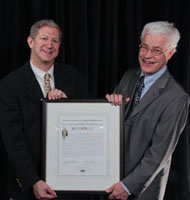
David Keyes, dean of the Division of Mathematical and Computer Sciences and Engineering at King Abdullah University of Science and Technology and an adjunct member of the Columbia University faculty, received the SIAM Prize for Distinguished Service to the Profession during ICIAM 2011. Shown here with SIAM president Nick Trefethen, Keyes was also honored in Vancouver for his election to the 2011 class of SIAM Fellows. Cited (in both cases) for dedicated service to the scientific community, Keyes is widely known in SIAM circles for his leadership in high-performance computing and computational science and engineering; it would be difficult to find a SIAM CSE-related activity that has not benefited from his involvement. (His selection as a SIAM Fellow also recognizes his work on implicit methods for the solution of partial differential equations.) Many of his efforts have been carried out on a wider stage: Especially noteworthy is his work at the Department of Energy, where his activities include the two-volume SCaLeS report (2003 and 2004) and the SciDAC project Towards Optimal Petascale Simulations (created in 2001 and now winding down). And as the conclusion of the SIAM prize citation makes clear, Keyes has met and surpassed the criterion of service "on the national level": In his current position at KAUST, "he is shaping the development of a new type of interdisciplinary research university, emphasizing CS&E and bridging Arab and Western cultures."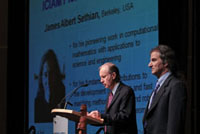
James Sethian, a professor of mathematics at the University of California, Berkeley, received the ICIAM Pioneer Prize in Vancouver, during the opening ceremonies of ICIAM 2011. Shown here with prize committee chair Bj�rn Engquist (left), Sethian was cited for "fundamental methods and algorithms that have had a large impact in imaging and shape recovery in medicine, geophysics and tomography, and drop dynamics in inkjets." Responsible for the "extraordinary range" of successful applications of his methods and tools are, in the words of the prize committee, "Sethian's unparalleled eagerness to learn thoroughly the engineering aspects of problems he works on, the accuracy and depth of his feelings for mathematical structure, and his broad mathematical knowledge." In response to a request from the guest editors of this fall's "ICIAM issues" of SIAM News, Sethian recruited a few co-authors and produced the description of one of his favorite recent applications; see Link to PDF.
Engquist, too, was honored in Vancouver, when he received the 2011 Peter Henrici Prize, a joint award of ETH Zurich and SIAM, at the CAIMS/Mprime/SIAM awards luncheon. Commending Engquist for "fundamental contributions to applied and computational mathematics, scientific computing, and applications to engineering and the sciences," the prize committee described him as "an outstanding example of a numerical analyst whose contributions are tied to serious analysis and applications." Photos by VisionPhoto.ca.
Rounding Out the ICIAM Opening Ceremonies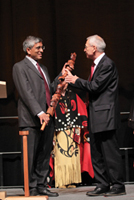
Readers who were among the nearly 3000 mathematical scientists who made their way to Vancouver in July will recognize the talking stick of Canadian First Nations tradition, passed here from ICIAM congress director Arvind Gupta (left) to ICIAM president Rolf Jeltsch at the conclusion of the opening ceremonies. Gupta is the CEO and scientific director of Mitacs, which along with the Canadian Applied and Industrial Mathematics Society and SIAM, organized ICIAM 2011. Each invited speaker throughout the week departed with a smaller version of the stick---empowered to give good talks in years to come!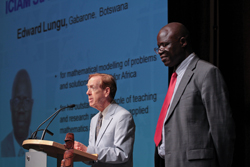
The ICIAM Su Buchin Prize was awarded for only the second time in Vancouver, to Edward Lungu, a professor of mathematics at the University of Botswana. Created to provide international recognition for outstanding applications of mathematics that have had an economic or cultural impact in developing countries, the prize went to Lungu both for his mathematical models of problems arising in Africa and for his "fundamental contribution to the development of teaching, research, and organizational structures for applied mathematics in southern Africa." Shown here accepting the prize from Gilbert Strang (left), the first recipient (2007), Lungu has focused his mathematical modeling efforts on three fields, each of central importance to problems of Africa: hydrology; ecology; and epidemiology, with the emphasis on understanding the progression of HIV/AIDS and the treatment of those who have the disease.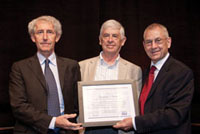
Alexandre Chorin of the University of California, Berkeley, and the Lawrence Berkeley National Laboratory, received the ICIAM Lagrange Prize in Vancouver. Shown here with Lagrange prize committee chair Alfio Quarteroni (left) and Rolf Jeltsch (right), Chorin was cited for "fundamental and original contributions to applied mathematics, fluid mechanics, statistical mechanics, and turbulence modelling." His methods for the numerical solution of the Navier�Stokes equations, in the words of the prize committee, are "the basis of the most popular codes in computational fluid mechanics."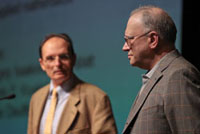
The ICIAM Maxwell Prize was awarded in Vancouver to Vladimir Rokhlin, a professor of computer science and mathematics at Yale University. Shown here with Maxwell prize committee chair Olivier Pironneau (left), Rokhlin has "had a profound impact on scientific computing and applied mathematics," the committee wrote, mainly through the development of "analysis-based fast algorithms." Notable among the algorithms are the fast multipole method, the non-equispaced fast Fourier transform, and, most recently, randomized matrix compression schemes.

